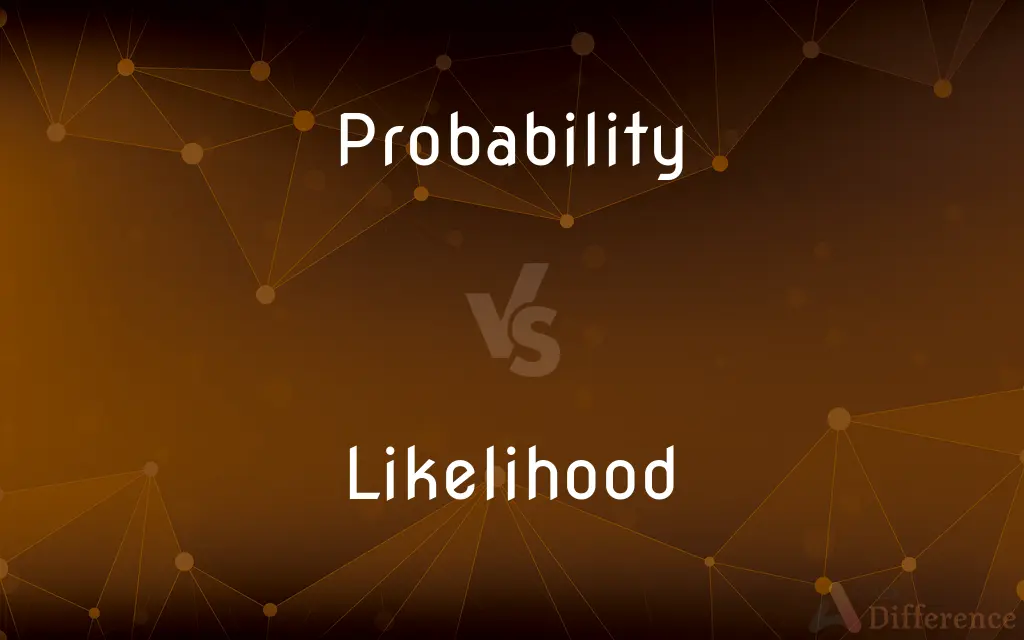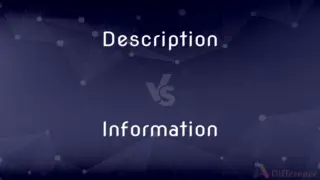Probability vs. Likelihood — What's the Difference?
By Fiza Rafique & Maham Liaqat — Updated on April 2, 2024
Probability quantifies the chance of an event occurring, based on a predefined space, while likelihood measures how well a specific model explains observed outcomes.

Difference Between Probability and Likelihood
Table of Contents
ADVERTISEMENT
Key Differences
Probability is a measure that quantifies the likelihood of an event happening within a well-defined set of outcomes. It is a foundational concept in statistics and mathematics, used to predict the occurrence of events in various scenarios. For example, the probability of flipping a coin and it landing on heads is 0.5, assuming the coin is fair. Whereas, likelihood refers to how probable a particular set of parameters is given an outcome. It's a concept used to evaluate the fit of a statistical model to observed data rather than predicting future events.
When scientists predict weather conditions, they use probabilities to convey the chance of rain, snow, or sunshine based on historical data and current conditions. On the other hand, likelihood is utilized in statistical inference to estimate parameters of a model that best fit the observed data, such as determining the average rainfall for a month based on historical weather data.
Probability is calculated by dividing the number of favorable outcomes by the total number of possible outcomes in a sample space. This approach is used in various fields, from gambling to risk assessment in insurance. Likelihood, however, does not sum up to one over all possible parameters and is more about comparing different sets of parameters to see which best explains the observed data.
While probability can be applied before an event occurs to estimate its chance of happening, likelihood is used after observing an event to assess how certain parameters could have influenced the outcome. This distinction highlights their applications in prediction versus explanation.
The calculation of probability often involves creating models that include all possible outcomes and their respective chances. In contrast, the computation of likelihood involves using observed data to back-calculate the probability of the observed outcome under different parameter values of a statistical model, emphasizing the inverse nature of the two concepts.
ADVERTISEMENT
Comparison Chart
Definition
A measure of the chance of an event occurring.
A measure of how well a set of parameters explains observed data.
Context
Used before an event to predict its occurrence.
Used after data collection to evaluate model fit.
Calculation
Based on the ratio of favorable to possible outcomes.
Depends on the observed data and model parameters.
Summation
The sum of probabilities of all possible outcomes equals one.
Does not sum to one; used for comparison of models.
Application
Prediction, gambling, risk assessment.
Statistical inference, model selection.
Compare with Definitions
Probability
Quantitative assessment of risk.
The probability of an earthquake in this region is estimated at 2% annually.
Likelihood
Not a probability, but a relative measure.
Higher likelihood values indicate a better model fit for the observed data.
Probability
A predictive tool in various scenarios.
The probability of rain tomorrow is 70%, according to the weather forecast.
Likelihood
Utilized in estimating model parameters.
Maximizing the likelihood helps in finding the best estimate of the population mean.
Probability
A fundamental concept in statistics.
Calculating the probability distribution helps in understanding data variability.
Likelihood
Integral to statistical inference.
The likelihood ratio test compares the fit of two models.
Probability
A measure based on the ratio of favorable outcomes.
The probability of drawing an ace from a standard deck of cards is 1/13.
Likelihood
A measure of model fit to observed data.
The likelihood that this model explains the stock market trends is high.
Probability
Probability is the branch of mathematics concerning numerical descriptions of how likely an event is to occur, or how likely it is that a proposition is true. The probability of an event is a number between 0 and 1, where, roughly speaking, 0 indicates impossibility of the event and 1 indicates certainty.
Likelihood
Based on observed outcomes.
Given the data, the likelihood of these parameters being correct is maximized.
Probability
The quality or state of being probable; the extent to which something is likely to happen or be the case
The rain will make the probability of a postponement even greater
Likelihood
The state or fact of something's being likely; probability
Situations where there is a likelihood of violence
Young people who can see no likelihood of finding employment
Probability
The quality or condition of being probable; likelihood.
Likelihood
The state of being probable; probability.
Probability
A probable situation, condition, or event
Her election is a clear probability.
Likelihood
Something probable.
Probability
The likelihood that a given event will occur
Little probability of rain tonight.
Likelihood
The probability of a specified outcome; the chance of something happening; probability; the state or degree of being probable.
In all likelihood the meeting will be cancelled.
The likelihood is that the inflation rate will continue to rise.
Probability
(Statistics) A number, ranging from zero to one, expressing either the projected likelihood that a specific event will occur or the observed ratio of the number of actual occurrences to the number of possible occurrences.
Likelihood
The probability that some fixed outcome was generated by a random distribution with a specific parameter.
Probability
The state of being probable; likelihood.
Likelihood
Likeness, resemblance.
Probability
An event that is likely to occur.
Likelihood
(archaic) Appearance, show, sign, expression.
Probability
The relative likelihood of an event happening.
Likelihood
Appearance; show; sign; expression.
What of his heart perceive you in his faceBy any likelihood he showed to-day ?
Probability
(mathematics) A number, between 0 and 1, expressing the precise likelihood of an event happening.
The probability of an event A occurring is denoted P(A).
Likelihood
Likeness; resemblance.
There is no likelihood between pure light and black darkness, or between righteousness and reprobation.
Probability
The quality or state of being probable; appearance of reality or truth; reasonable ground of presumption; likelihood.
Probability is the appearance of the agreement or disagreement of two ideas, by the intervention of proofs whose connection is not constant, but appears for the most part to be so.
Likelihood
Appearance of truth or reality; probability; verisimilitude.
Probability
That which is or appears probable; anything that has the appearance of reality or truth.
The whole life of man is a perpetual comparison of evidence and balancing of probabilities.
We do not call for evidence till antecedent probabilities fail.
Likelihood
Statistical probability; probability of being true or of occurring in the future; as, the likelihood of being abducted by aliens is close to zero..
Probability
A measure of how likely it is that some event will occur;
What is the probability of rain?
We have a good chance of winning
Likelihood
The probability of a specified outcome
Probability
The quality of being probable
Common Curiosities
Is probability always less than or equal to one?
Yes, probability values range from 0 to 1, indicating the certainty of an event happening or not happening.
What distinguishes probability from likelihood?
Probability quantifies the chance of an event's occurrence, while likelihood measures how well a model fits observed data.
How does likelihood contribute to model selection?
Likelihood helps in comparing different models to determine which best explains the observed data.
Can the same data have different likelihoods?
Yes, the likelihood of observed data can vary under different models or parameter sets.
Can likelihood be used to predict future events?
Likelihood is more about evaluating model parameters based on observed data, not directly predicting future events.
What role does likelihood play in statistical inference?
Likelihood is crucial for estimating parameters and testing hypotheses in statistical models.
How are probability and likelihood used differently in research?
Probability is used for planning and predicting outcomes, while likelihood is used for analyzing and interpreting data post-experiment.
Can probability apply to non-numerical events?
Yes, probability can apply to any scenario with uncertain outcomes, not just numerical ones.
What's the relationship between likelihood and probability?
Likelihood uses probability to assess how specific parameter values fit observed data.
Why is probability important in everyday decision-making?
Probability aids in assessing risks and making informed decisions in uncertain situations.
Does a higher likelihood mean a model is true?
A higher likelihood indicates a better fit to the data, but it doesn't prove the model's truth; it only suggests relative support among considered models.
Are there limitations to using probability and likelihood?
Both concepts assume accurate models and data; errors in these can lead to misleading results.
How does the context of use affect the choice between probability and likelihood?
The choice depends on whether the goal is to predict an event's occurrence or to evaluate how well data support a model.
Can you have likelihood without probability?
Likelihood assumes a probabilistic model but focuses on parameter estimation rather than event prediction.
Can likelihood values be compared across different data sets?
Likelihood values are generally not directly comparable across different data sets unless normalized or standardized in some way.
Share Your Discovery

Previous Comparison
Element vs. Compound
Next Comparison
Description vs. InformationAuthor Spotlight
Written by
Fiza RafiqueFiza Rafique is a skilled content writer at AskDifference.com, where she meticulously refines and enhances written pieces. Drawing from her vast editorial expertise, Fiza ensures clarity, accuracy, and precision in every article. Passionate about language, she continually seeks to elevate the quality of content for readers worldwide.
Co-written by
Maham Liaqat













































